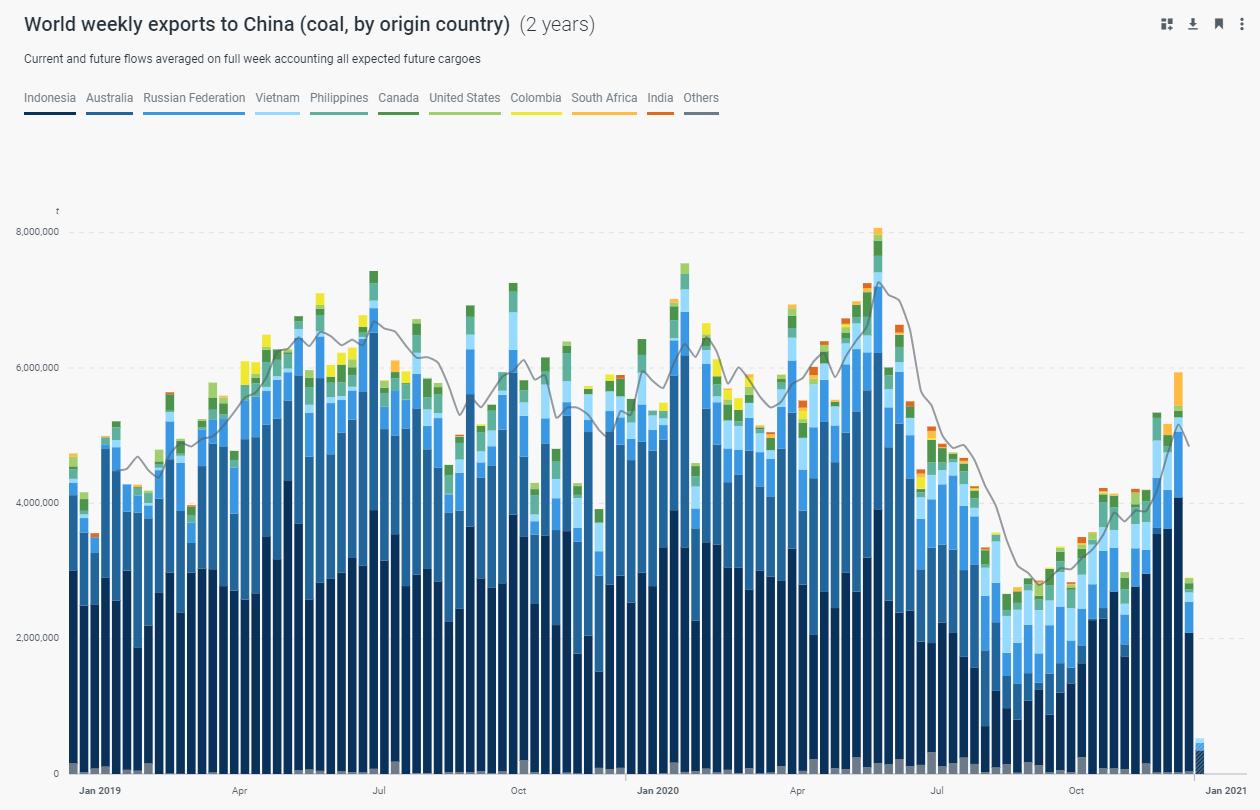There is a line of argument you can find in the opinion pages of almost any Australian newspaper that goes along these lines.
China is BIG!
We are SMALL!
We cannot live without China!
We must compromise on these things because they can or will cut us off if we don’t comply! It is up to us, there is no other way!
I would like to unpack this.
Firstly, what do we mean by big? A big country, a lot of people, a lot of consumption and investment and GDP? By all accounts this is so - but similarly for the US, Eurozone and even Japan. What matters to Australia is principally whether they are a major trade partner and by all accounts they are our largest export destination. So far so simple and consistent with arguments brought forth by James Laurenceson, Geoff Raby and others.
Peering into what China imports the picture changes - most of what China imports from Australia are materials, and in particular commodities like iron, coal and LNG. Charts from the excellent Observatory of Economic Complexity.
Drill further into the other colors - animal products (beef, lamb), metals (copper, zinc, nickel) , textiles (wool, cotton), foodstuffs (barley) and it is all commodity heavy and fungible. These are unfinished goods with limited differentiation which can be sold almost anywhere. Trade actions are unpleasant but inherently short lived so long as other markets and suppliers exist. We can see this in Australian barley thus far: despite some disruption there are plenty of other buyers and Chinese piquish trade actions just rearrange who buys from whom, not whether Australia has a market at all.
For products like metals and LNG the market clears regardless - there are other buyers, other sellers, and life goes on. So while trade action are disruptive and a way of expressing displeasure for these commodities, do they matter outside of the news-oped-lobbying cycle and the time it takes to reroute shipments? Not particularly.
Coal and iron are different. Iron in a good way, coal in a bad way. China has very little in the way of high quality iron deposits and is the only game in town in imports, Australia in turn is the only game in town in exports. Brazil has been, at least for the decade I have covered companies in this space, the once and future supply expansion that never arrives. Australia and China are stuck with each other for now. There are longer term questions for Australia to ask like “how realistic is it that China will continue to consume steel at three times the rate of Japan and Korea on a per capita basis while its population shrinks” but I will leave that for another day.
Coal is the unhappy case where it is a big market for Australia to export to China, but China is an enormous coal market that is mostly self sufficient and which has been working towards greater self sufficiency. The chinese coal consumption breakdown is below and less than 10% is was imported (270MT of 3,073MT consumed).
In this market, China is big and Australia is small and the recent seizure of imports shows. A deeper look shows that Australia is not alone here and that imports as a whole are shrinking anyway. Diplomatic issues matters but perhaps not so much as a fundamentally mercantilist development model where efforts to import substitute are the rule and not the exception. Recent efforts in semiconductors and the like are a testament to this and there is not reason to not expect it to continue.
To that extent, perhaps we should think less about “big” and “small” in a playground sense and more in terms of market share, substitutes, and the outlook given that mercantilist output. If China is big and we have other customers then China’s fits of pique should be noted and duly ignored: they don’t matter any more than any other customer and few customers are so politically demanding. I do not recall India, Japan or South Korea issuing fourteen demands but perhaps my memory fails me. For iron ore, we are stuck for now and all the verbiage on either side is unlikely to change facts on the ground. For those markets that are being adversely impacted we need to ask how much of this is political and how much of this was a long time coming: China did not build thousands of miles of freight rail to better utilize domestic coal in a single year out of spite - it was a decade long process and preceded any issues with Australia over anything political.
This leaves a long but small dollar value tail of products - mostly agricultural or finished goods like wine, but hardly represents the end of the world as we know it. In my opinion it would be worthwhile to face the realities of a trade landscape changing for reasons beyond the political (coal), allow markets that can adjust themselves to do so (most commodities) and work with export promotion agencies to support those that face more acute short term issues (wine and others). It is important to keep a sense of the scale here though: the sense of crisis is principally in coal, and was largely inevitable as China slowed and its efforts to import substitute bore fruit. Nothing personal, strictly Leninist Gerschenkron development economics. The rhetoric should likely match this: while whipping up panic sells copy and subscriptions at media organizations it does not represent any kind of objective reality and nor does it merit any response to China’s demands. We would not consider it from any other country, so why them?
In summary, for most things China is big, we may be small, but it does not matter and steps three and four do not follow.
That summarizes the general picture in goods trade - I will return to cover services and education, and wine in particular separately.






